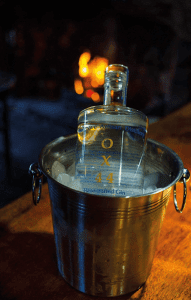Our beautiful part of the world is full of fantastic food & drink producers. We uncork some of our favourites to enjoy this summer…
If summer joy could be encapsulated in a sound, surely it would be the “pop” of a perfectly chilled bottle? And when you’re uncorking the fruits of your own labours, success is sweet indeed…
“This land is a b***** to cultivate,” says Henry Laithwaite as he stands on the undulating Chiltern slopes alongside his wife Kaye. “It’s so flinty that the harrow kept breaking when we started working the soil, which inspired our name. But it is a very special spot.”
Indeed, this beautiful Thames Valley terroir is one of the many magical ingredients (along with lots of hard work) which have helped conjure up the lush velvety blushing fizz we uncork and sample in Harrow & Hope’s adjoining state-of-the-art winery. This non-vintage brut rosé, made exclusively from pinot noir grapes, won a gold medal in the Sommelier Wine Awards. Produced using traditional methods and the precious fruit from these relatively young vines, Harrow & Hope’s sparkling wines are flying the flag for the Great British food and drink revolution. Visit www.harrowandhope.com
Here at Round & About Magazine we are passionate (not to mention greedy and thirsty) supporters of local pubs, restaurants and producers. After all, anyone working in the food & drink industry will know all too well that it takes a lot of hard graft to create the perfect recipe for punters to enjoy.

Gin has seen a surge in popularity and there are some interesting local producers in this spirited part of the world. Chalgrove Artisan Distillery use juniper berries, coriander seed, angelica root, cardamon and black peppercorns, honed in an alembic copper still, to create their OX44 Gin; visit www.chalgroveartisandistillery.com.
Did you know gin started out as a medicine (it was thought to cure gout and indigestion)? In the 18th century, alcohol was safer to drink than water and gin was cheaper than beer; it was untaxed until the government cottoned on, sparking hooch production. Much of the gin was drunk by women (with historians blaming it for child neglect and citing wet nurses giving gin to babies to quieten them), landing many in debtors’ prisons or the gallows, or driving them to madness, suicide and death (hence the term Mother’s Ruin). However, these days it’s a more joyful summer spirit, and can even be considered a beauty tonic…
Young In Spirit is the world’s first company which combines spirits with pure collagen. Oxford “gintrepreneurs” Camilla Brown and Liz Beswick have earned attention from Vogue and The Daily Mail, among others for their Collagin; www.collagin.co.uk.
The artisans at Toad in Oxford craft gin, absinthe, vodka and rye whiskey worth a shot – and there’s a new cocktail bar at Bicester village; www.spiritoftoad.com. And Mr Hobbs Gin, part of the Hobbs of Henley Experience, has launched two new fruit flavoured gin liqueurs; Rhubarb & Ginger and Raspberry & Elderflower www.mrhobbsgin.co.uk
Is beer your tipple? Hoppy bunnies are spoilt for choice. For tours, tastings and hearty ales, check out Witney’s wondrous Wychwood Brewery (www.wychwood.co.uk). Cirencester’s Corinium Ales (www.coriniumales.co.uk), Chipping Norton’s Hook Norton Brewery www.hooky.co.uk. A passion for good beer and social justice fuel Botley’s Tap Social, where the team offer live music and street food every Friday and Saturday in August as well as the monthly comedy night and reggae night, www.tapsocialmovement.com. Ciderniks near Kintbury has been making natural ciders, pure apple juice and cider vinegar since 2003; www.ciderniks.com
Spice up your life…
Variety is the spice of life and there are so many restaurants to enjoy this summer. Michelin-starred Atul Kochhar (the father of Benares in London and Sindhu in Marlow) hosts Indian nights in August at his divine Hawkyns in Amersham; www.hawkynsrestaurant.co.uk. The Bottle & Glass Inn in Binfield has made a splash, gaining a nod from Harden’s Guide and a Michelin Plate; www.bottleandglassinn.com. For summer dining in style, check out The French Horn in Sonning (www.thefrenchhorn.co.uk), The Crooked Billet in Stoke Row (www.thecrookedbillet.co.uk) and The Nelson in Brightwell Baldwin www.thenelsonbrightwell.co.uk. Feast on fresh Lebanese and Middle Eastern delicacies (many vegan or veggie) including colourful salads and wraps at Comptoir Libanais in Oxford’s Westgate; www.comptoirlibanais.com
We also love the rustic summer vibes of The Highwayman (www.thehighwaymaninn-checkendon.co.uk). Cheers!







